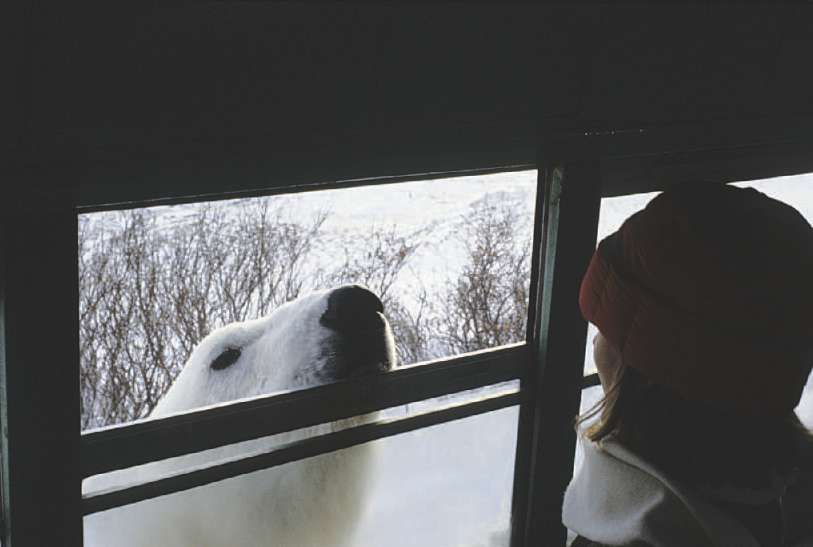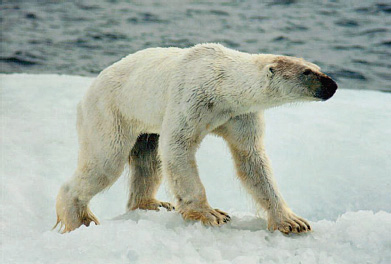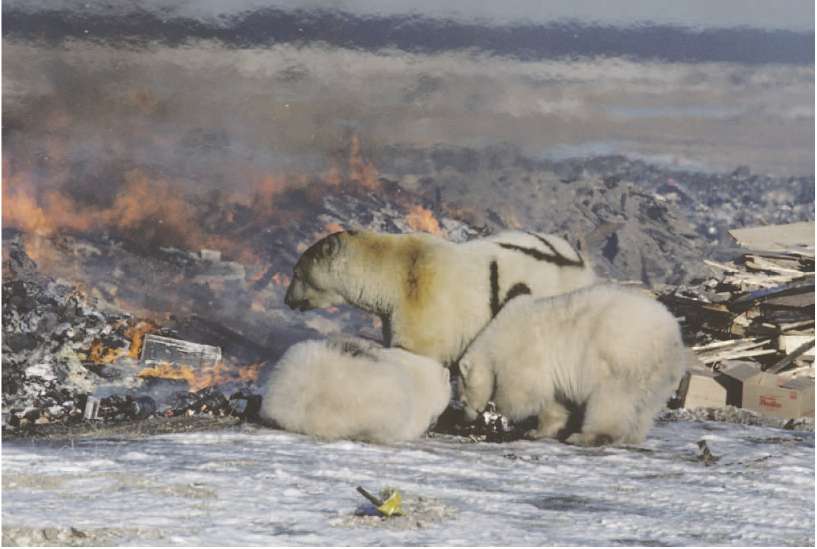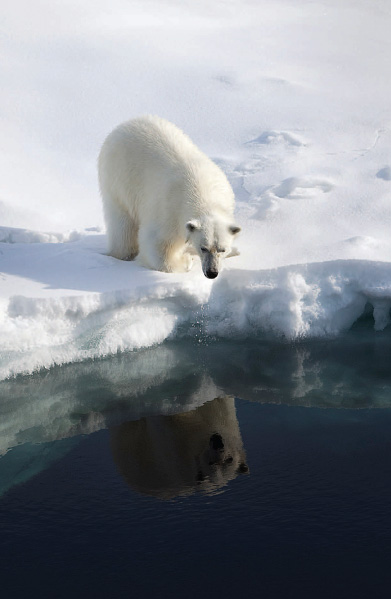The Great White Bear (21 page)
Read The Great White Bear Online
Authors: Kieran Mulvaney

The Tundra Buggy Lodge near the town of Churchill, on the shores of Canada's Hudson Bay.
Robert and Carolyn Buchanan/
PolarBearsInternational.org
 
Close encounter: A polar bear investigates the occupants of a Tundra Buggy near Churchill.
Dan Guravich/
PolarBearsInternational.org
 
A skinny polar bear photographed off the Alaska coast. As sea ice melts and retreats, scientists predict polar bears will find it harder to feed and survive.
Kieran Mulvaney
 
Polar bears feeding at the town dump in Churchill. Since the dump was closed, instances of so-called problem bears have decreased dramatically.
Dan Guravich/
PolarBearsInternational.org
 
A polar bear appears to stare at its own reflection in the water off the coast of Greenland.
Nick Cobbing
Time is necessarily elastic
when one takes the train from Winnipeg to Churchill.
It isn't that the distance is especially immense: approximately 625 miles as the crow flies, somewhat longer when following the route of the railway, which veers first to the northwest and then northeast before ultimately turning due north. But the ground, often boggy, is less than ideal terrain; it freezes and melts, stretching and sinking beneath the tracks, which twist and warp, ensuring that for long stretches the train can do little more than crawl.
Accordingly, a journey that by air takes but a couple of hours stretches into approximately two days by rail. Although an official timetable optimistically predicts arrivals at and departures from the various stops en route, it functions primarily as a guide to how far behind schedule the train is falling.
On such a voyage, the key to contentment is a surrender of control, an ability that does not come naturally to all and on this particular occasion seemed especially vexing for one passenger. He studied the Timetable of Questionable Accuracy with the kind of fervor normally reserved for the Torah, using itâand, perhaps, an unseen set of actuarial tablesâto calculate and loudly pronounce, with each stop the train made en route, our average speed and likely time of arrival. Concerned over our glacial progress, he grilled a fellow passenger, a Churchill veteran, for keys to maximizing his time when eventually we reached our destination. How long would he need to set aside to be guaranteed a bear sighting? We were scheduled to arrive on a Saturday afternoon; if he had "done" the polar bears by the end of Sunday, what would be the best way for him to spend the remaining day before his departure?
Apparently satisfied by the answers, he retreated to his room; his fellow passenger and I sat in silence, gazing out the windows of the observation car as the Manitoba wilderness rumbled past, before I began what I hoped was a gentler interrogation.
Doug Ross had until recently been director of the Winnipeg Zoo, which as we spoke that evening remained home to Debbie, now deceased but then, at age forty-two, the world's oldest known polar bear. The previous year, Doug had taken early retirement and begun a life in which, as he put it, he would work only when he needed to, doing only the things he wanted to. Having spent many years taking care of, among other charges, a polar bear in captivity, one of the things that he wanted to do was spend time with polar bears in the wild. So he had become a driver of a Tundra Buggy, a tourist vehicle that looks like a bus on monster truck wheels, from which visitors to Churchill can observe polar bears in relative comfort and safety.
I had spent plenty of time in northern communities, had lived in a cabin in Alaska, was perfectly accustomed to human communities living cheek by jowl with large wild mammals. But Churchill lies directly in the path of polar bears that migrate from summer shelter to the coast of Hudson Bay in anticipation of the bay's waters freezing; it was one thing to have experienced, as I had on several occasions, a moose lying in the driveway or walking down the street, but the prospect of a large and hungry carnivore lurking around the corner seemed to me an entirely different proposition.
"The thing is," Doug began, "a community like this, we might think it's a big deal to live with polar bears, but for them, it is what it is. I would see kids out in the playgrounds at seven or eight in the evening, and I'd think, 'Wow, is that safe?' But what else are they going to do? I imagine they're taught to be really careful."
We paused as we looked out the window at a brief sign of life, the streets and signposts of an anonymous hamlet past which the train slowly rumbled.
"There were times in the night," he continued, "when I would hear these big crackers going offâyou know they fire cracker shells [12-gauge cartridges that explode in the air with a loud bang] from shotguns to scare the bears. Well, first you'd hear all the dogs in town going crazy, and then you'd hear the bangers going off. They tell you all these storiesâI don't know if it's just to get us going or what, but they say that, especially if you're out at night, always be sure you know where the nearest car is. Because people leave the doors to their cars and trucks unlocked, just in case."
We headed down to the dining car, and after a light dinner of grilled cheese sandwich and soup, I retired to my accommodation. Officially called a roomette, it could charitably be described as snug. With the bed folded down from the wall, there was enough room for ... well, the bed. Lifting the bed back up again required stepping out into the hallway; completing the operation revealed a couch of sorts, a padded seat that covered a flush toilet, a fold-down washbasin, and an assortment of cubbyholes for assorted storage. In Manhattan, it probably would rent for about $2,000 a month.
I woke up a few times in the night, as was perhaps to be expected given that I was sleeping in a tiny cabin on a gently rocking train, and I looked out to see the tall prairie grass and, later, larch and spruce bathed in our transport's reflected glow. The sky was clear, and Orion was instantly recognizable, low on the horizon, as I peeked out my window.
When I slept, I dreamed. Disconcertingly, I dreamed that a polar bear had clambered aboard the train and was at this moment padding in a predatory fashion among the alleyways. The Dream Conductor's assurances that we were all safe did nothing to assuage the fears of Dream Kieran, as he cowered behind his closed and locked door.
The first people to arrive in the environs of what is now Churchill, ancestors of the Inuit who inhabit the region today, did so, as far as we know, approximately three and a half thousand years ago. They were ultimately joined by Chipewyan people from the north and Cree from the south, but a further millennium would elapse before Europeans penetrated the waters of Hudson Bay. The initial wave was English, led by the man after whom the bay is now named, but the first to step ashore and winter by the banks of the Churchill River were Dano-Norwegian.
By the time the
Unicorn
and the
Lamprey,
sailing under the command of Jens Munk, arrived at the mouth of the river in September 1619, their crews were exhausted from a long and trying voyage, punctuated by a battering from severe fall storms. Spying an abundance of small plantsâand, in particular, a riot of cranberriesâon land, the men anchored their vessels and moved ashore, warming themselves by a fire they maintained day and night, and strengthening from the addition of fresh fruit to their diet.
There was fresh meat, too, to satisfy the men's hunger and improve their healthâptarmigan, caribou, reindeer, and, for reasons the sailors likely neither knew nor particularly dwelled upon, a high concentration of polar bears. But the beneficial bounty didn't last long.
With the onset of winter, the caribou retreated inland, where the snow was deep and soft and where the poorly equipped mariners could not follow. The crew's clothing was inadequate for the cold temperatures and angry winds that tore across the ice of Hudson Bay. By January of 1620, the men began, one by one, to dieânot of the cold, but of some unknown disease that made them nauseous, rendered them weak, led to dysentery, and caused them to lose their appetite, further weakening them. By March, the hardened ground and the weakened men combined to make further burial of corpses impossible; the dead were either thrown overboard onto the ice or left on the ground where they had fallen.
In the middle of April, Munk recorded that just five men remained; shortly thereafter, that number had dwindled to three. It would dwindle no further. The return of spring heralded the reemergence of plant life, the juices of which Munk and his companions sucked desperately from their stems. As the ice broke up, the survivors set nets to catch fish; the men's teeth were too loose in their gums for them to chew, so they boiled the fish and drank the broth. When they regained sufficient strength to discharge their ammunition, they did the same with the migrating birds that had returned from the south. Remarkably, on June 16, the three men sailed the
Lamprey
out of Churchill River, into Hudson Bay, and on a successful voyage back to Norway.
For centuries, the prevailing assumption was that the crews' sickness was the result of scurvy; today, another theory holds sway, that the bounty of bear meat that must initially have brought great joy was ultimately the bearer, as it were, of disease and death. Polar bear meat is frequently infected with larvae of the
Trichinella spiralis
roundworm, the cause of trichinosis, a scourge of those unwise enough to eat undercooked game meat or pork. Munk suffered less because he roasted his personal supply more effectively than did his crew, who ate theirs parboiled in vinegar. But partly boiled bear meat is at best an acquired taste; the two men who chose to acquire as little of it as possible were the two who survived to sail the
Lamprey
back to Europe with their captain.
Munk had hoped to make contact with some of the natives he assumed lived in the area, and he rued the fact that his men shot a domesticated dog in the dark of night, thinking it to be a wolf. Had they captured rather than killed it, he reasoned, perhaps they could have tied some trade items around its neck and sent it back home, in the hope that its owners would want to barter food for goods.
